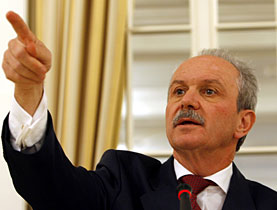
Central bank head wants end to unjustified pay

The president of the Swiss National Bank says the banking sector should not pay employees bonuses that put short-term results ahead of long-term performance.
Jean-Pierre Roth said financial institutions had to correct what he termed the excesses in their pay, adding that it was “time for answers” to a long debate on the issue.
He said the banks that had been buffeted by the current financial storm had to take a careful look at the ways they applied corporate governance.
In particular, they should examine the role of their respective boards of directors in carrying out the necessary checks and balances to ensure efficient risk management.
Switzerland’s two largest banks – UBS and Credit Suisse – have both made huge losses as a result of the subprime mortgage crisis in the United States, which have led to calls for tighter controls on the country’s banking sector.
Roth told the SNB’s annual shareholder meeting in Bern it was “astounding” that a problem, which appeared to be confined to one single segment of the mortgage market in one country, could have resulted in a crisis of global proportions.
Vulnerable
He said this situation has not only come about because of the globalisation of the financial markets; there was another reason.
“International banks have become increasingly vulnerable over the last few years – vulnerable because of their thirst for profit and their underestimation of the ensuing risks.”
He pointed out that risk-measuring systems at the banks could not cope with the crisis despite the fact that “the best-informed experts around” were monitoring them. Losses clearly surpassed those calculated by statistical models, Roth said.
“It illustrates that no model can do complete justice to the complexity of financial instruments and the economic environment in which banks operate these days.”
He also said calls for more sophisticated risk management systems, supervision and regulation of banks were understandable.
“Room for improvement”
“There is room for improvement in these areas, and it must be exploited.”
Roth argued that a tightening of the traditional requirements in the area of bank capitalisation, liquidity and indebtedness were needed.
“For a financial centre like ours – which includes international banks whose private banking arms generate substantial revenue and consequently rely on a spotless reputation – such action is vital.”
In remarks specifically on the Swiss economy, Roth said that even though Switzerland’s performance was still “excellent”, 2008 was fraught with considerable uncertainties.
With the global economy slowing down, Switzerland would not go “unscathed”.
He also warned that an increase in commodity prices, in particular for oil, was triggering an inflationary effect.
Roth emphasised that the SNB’s main priority was to keep inflation in check.
“The financial storm should not make us forget that it is our mandate to ensure price stability in the medium term.”
swissinfo with agencies
There are 2,259 registered shareholders in the Swiss National Bank.
It is 63.2% owned by 79 public-sector shareholders, with the remaining 36.8% in the hands of private shareholders.
The main shareholders are the cantons of Bern (6.63% equity participation), Zurich (5.2%), Vaud (5.4%) and St Gallen (3%).
At its meeting in March, the Swiss National Bank forecast economic growth of 1.5% – 2% for this year. GDP grew by 3.1% in 2007.
However, it has warned against the risks from the ongoing global credit crisis.
The National Bank forecast an inflation rate of 2% this year, easing to 1.4% in 2009. In March it stood at 2.6%, its highest rate in more than a decade.
It equates price stability with a rise in the national consumer index of less than 2% per year.
Indicators including the KOF Swiss Economic Institute barometer point to a slowdown in the future but the economy is still showing resilience and company results outside the banking sector have been healthy.
The SNB has maintained the target for its key interest rate at 2.75% since September.

In compliance with the JTI standards
More: SWI swissinfo.ch certified by the Journalism Trust Initiative




























You can find an overview of ongoing debates with our journalists here . Please join us!
If you want to start a conversation about a topic raised in this article or want to report factual errors, email us at english@swissinfo.ch.